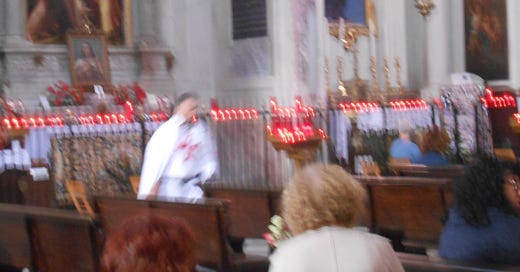#07 Getting caught up in things, Nathaniel Hawthorne and Saint Rita
Bologna 15.06.24 (& 22.05.24)
In Nathaniel Hawthorne’s The Marble Faun, there is a moment when his characters, Donatello and Miriam, get caught up in something. At risk of quoting at length/narrating (this is my blog, so I will do what I want), Miriam and Donatello hear music coming from around the corner while walking around the Borghese gardens together and decide to follow it; Miriam says “come; the strain of music will guide us onward like a gaily coloured thread of silk.”1 “She flung herself into the folly of the hour.” Around the corner is a “vagrant band,” who happen to be playing in the gardens rather than Rome proper because “it chanced to be a feast day.” Though it’s not a very poetic formulation, it is an apt description: Miriam and Donatello are caught up in a flash mob.
It might be that there was magic in the sound, or contagion, at least, in the spirit which had got possession of Miriam and himself; for, very soon, a number of festal people were drawn to the spot, and struck into the dace, singly, or in pairs, as if they were all gone mad with jollity… Here, as it seemed, had the Golden Age come back again, within the precincts of this sunny glade; thawing mankind out of their cold formalities; releasing them from irksome restraint; mingling them together in such childlike gaiety, that new flowers (of which the old bosom of the Earth is full) sprang up beneath their footsteps.
But there is a sense of urgency about this incidental coming together of things. Even in the moment, and a little before the moment, Donatello is anxious about it ending and reverting back, “‘Dance, dance!’ cried he joyously. ‘If we take breath, we shall be as we were yesterday.’” And he’s right to worry.
Whether it was that the harp-strings were broken, the violin out of tune, or the flautist out of breath, so it chanced that the music had ceased, and the dancers come abruptly to a pause. All that motley throng of rioters was dissolved as suddenly as it had been drawn together… If a few of the merry-makers lingered among the trees, they had hidden their racy peculiarities under the garb and aspect of ordinary people, and sheltered themselves in the weary common-place of daily life. Just an instant before, it was Arcadia, and the Golden Age. The spell being broken, it was now only that old tract of pleasure-ground, close by the people’s gate of Rome…
Firstly, I’d highly recommend this lovely novel which, in turn, my mum recommended to me. It is kind of Study Abroad Vibes because it’s about expat artists in Rome, and it has this underlying Catholic Italian magical realism thing that is very evocative of Protestant Americans discovering the fervency of Italy. I will also half-apologise that my writing style in some of these blog posts has been borrowing from the long-sentences-and-lots-of-commas thing that I’ve been consuming in Hawthorne’s work that you can see in these excerpts. But more pressingly, this chapter resonated with me because I’ve been thinking a lot about getting caught up in things because I have been getting caught up in things. Not quite flash mobs (I have taken part in a flash mob once, for Oonagh’s birthday in Sona’s apartment to Heads Will Roll—I was a backup dancer), but certainly motley throngs and follies of the hour that are often contagious and magical.
Attendance of a boring and unhelpful tour turns into serendipitous lunch at a fish restaurant turns into talking until far after all other patrons have left and a lovely new friendship. A pop-in to a church during mass leads to watching from a pew and listening to choir singing or violin music. A large group trip to Rimini Miramare turns into half-skinny-dipping in spring-fresh Adriatic water, four friends venturing into central Rimini, a busker singing Walk on the Wild Side, a fishy dinner, and falling asleep on the last train back. A different trip to Rimini on a Sunday happens upon a beautiful antiques market. A quick lunch study break turns into three bottles of Lambrusco and my first trip up to San Luca. A Giardini Margherita reading session turns into hours of reading and music listening, a long walk, and a sushi dinner. In Bologna, walking home at night down Via Zamboni often means happening upon some kind of politically-motivated rave (not kidding). Taking the wrong turn up a hill and someone happening to be buried that day turns into a trip to the San Vito Lo Capo cemetery, and all the associated horrors and awkwardnesses and self-discoveries that happen in Italian small-town cemeteries. One person reading a poem at dinner turns to everyone having something to read turns to me learning a lot. A dinner party for two the night before an exam turns into a wine-sipping party for four and one of the most magical evenings I’ve had in this city.
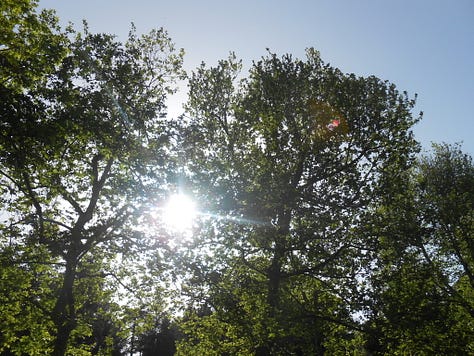
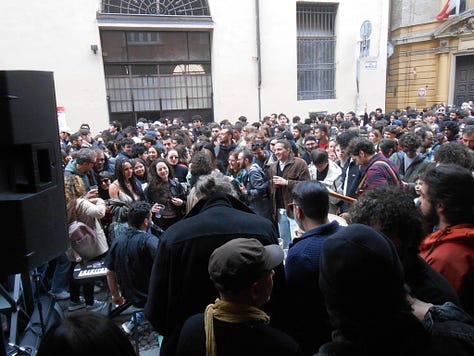
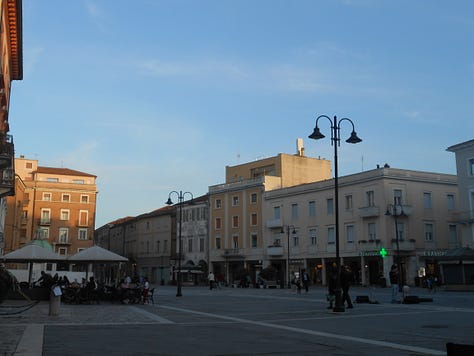
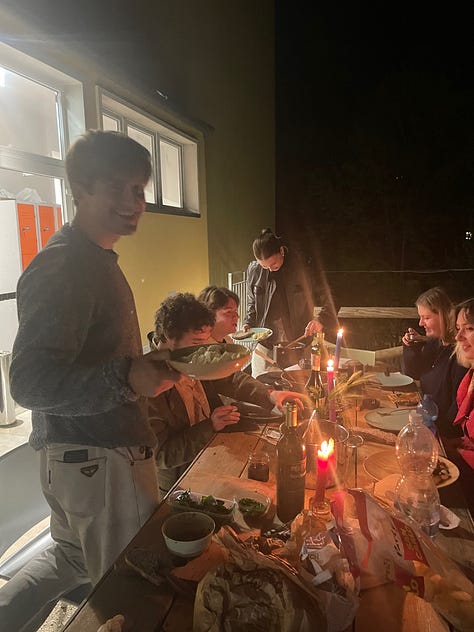
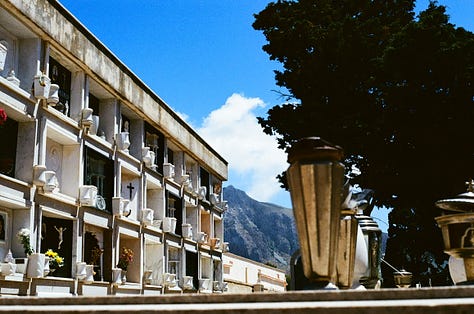
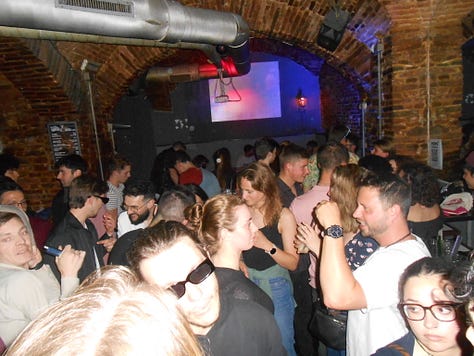
In general terms: a text often becomes a hangout; an aperitivo often becomes a long dinner; a bar often leads to another bar; a walk often happens upon something interesting; candlelight causes magic; friends and confederates are hiding everywhere; the dancers dance in and the vagrant band is just around the corner. A key difference I find with Hawthorne’s flash mob, which “dissolved as suddenly as it had been drawn together,” is that these moments often last for far longer than they took to begin (often they begin just with the words “yes” or “why not”) and then continue to last long in the memory.
It is the 22nd of May, and I am paralysed by anxiety about doing an oral exam the next day. Teddy and I get a panino at La Prosciutteria on Via Oberdan and walk around centro looking for gifts for his family and friends and our program’s directors, who we are saying goodbye to that afternoon at an organised non-alcoholic farewell aperitivo. We get them some Bolognese wine @ Drogheria Gilberto and flowers @ Frida’s.
Walking around Bologna, everyone seems to be carrying roses. As we walk West, we approach the Basilica di San Giacomo Maggiore where there is a long line of chioschetti selling €1.50 roses and banners that read S. RITA. At the entrances to S Giacomo stand very Catholically dressed men in very special, magnificent clerical robes. Inside, hordes of people bring roses and red candles to a statue of Saint Rita of Cascia, who lived and died six centuries ago. It happens to be Her feast day! Swept up in it, we come in too. Two people are employed to take people’s offerings to Rita and set them around Her chapel, and they have to start putting the incoming candles away in a corner because there are already too many. We pay our respects – though after buying an expensive bouquet at Frida’s I do not buy Rita a rose – and I ask Her kindly for help with my exams. Further along, we pop our heads into the little Chiesa di San Sigismondo, a particularly university/academic-orientated church. Then we have our aperitivo and go home.
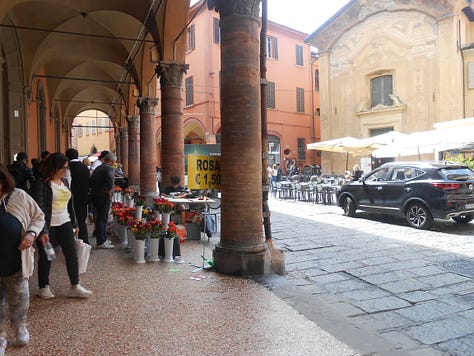
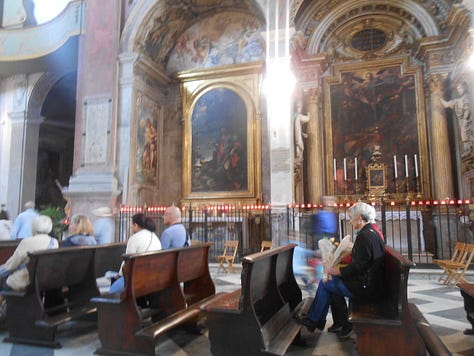
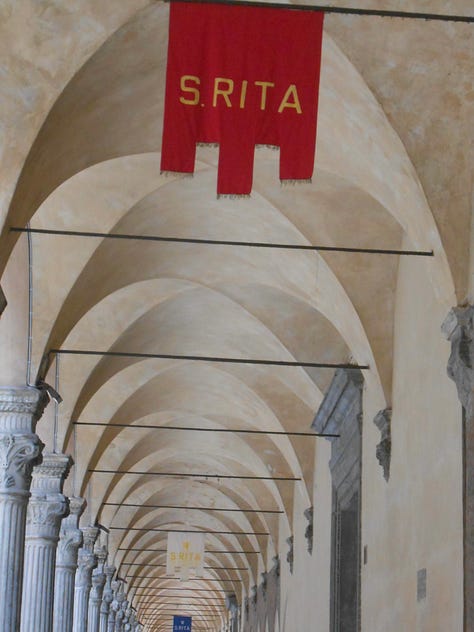
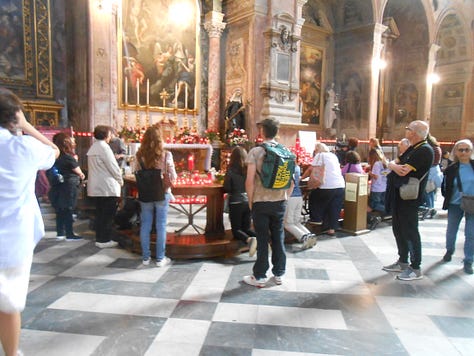
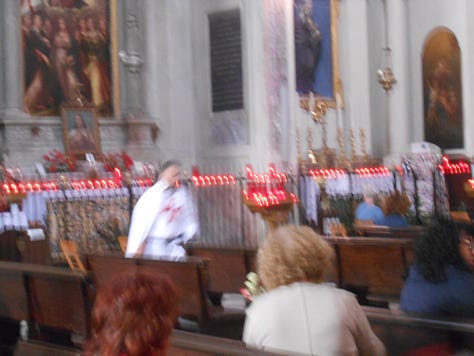
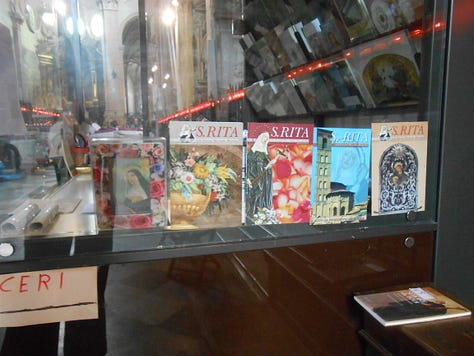
After some agonised unproductive hours at home, I resolve to need people around me, so I make Jonathan come over for dinner. He arrives then goes out again to get tortellini and gets literally caught in the massive football celebrations for Bologna FC on Via dell'Indipendenza and is gone for much longer than it takes to boil the water, even with my crap hob. When he gets back, we acknowledge this prolific feeling of getting caught up in things, and I think about getting drawn in by the roses to see Saint Rita this afternoon. Delightful heirloom tomatoes and squac cheese and tortellini in tomato sauce, but I am still feeling anxious so have little appetite. Then Beck and Olivia arrive and we have a really pleasant wine and music and reminiscing moment, which doesn’t sound like much when written down but was everything. Olivia reads aloud the John Berger passage on Bologna’s portici, from the book The Red Tenda of Bologna that by now we’ve all read and delighted in.
For those living here, the arcades are a kind of personal agenda, made of stone, brick and cobbles. You can visit your creditors, your secret love, your sworn enemy, your favourite coffee shop, your mother, your dentist, your local office of unemployment, your oldest friend, or a bench where you regularly sit down utterly alone, adjusting the elastoplast you’ve put over a sore wart on your index finger — you can keep all these rendezvous without ever being exposed to the sky. And what difference does this make to the facts of your life? None. Yet under the arcades the echoes of those facts sound different. And in the evening Pleasure and Desolation take their evening stroll along the arcades and walk hand in hand.
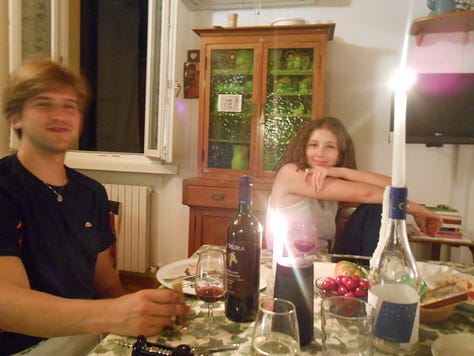
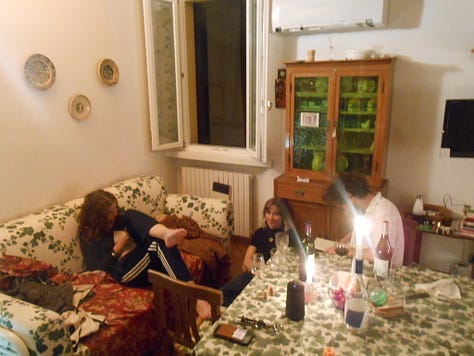
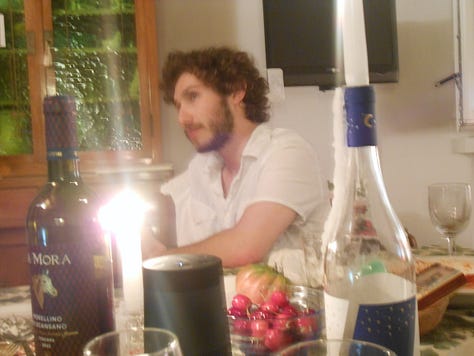
All this, withstanding me getting caught up in telling the story of that evening and going on a tangent, to say that I like living like this. I don’t know if it will stop feeling like this when I leave Bologna – there is a kind of personal openness to things I have felt here coupled with an openness that comes from a city that asks you, often, to know it and to enjoy it – but I sincerely hope it doesn’t. When Josh and I talk about bringing the ‘study abroad mentality’ back to our Senior year and into the rest of our lives, this is one of the most important things I mean. I want to stay open, stay curious, stay free to get caught up in things. I want to surround myself with people who do the same. But I am not anxious like Donatello’s “If we take breath, we shall be as we were yesterday.” Most of me sincerely believes that I can take a breath after my amazing time in Bologna and then rejoin the dance whenever I’d like, and it’ll still be there for me to make.
This whole section, which I feel no need to cite properly and individually, spans the end of Chapter IX, The Faun and the Nymph, and Chapter X, The Sylvan Dance. I am reading the Oxford World Classics edition.


